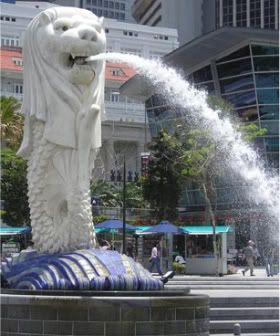Kelvin Teo

The Merlion - Symbol of Singapore's economic nimbleness
Our leaders and economic advisor Dr Albert Winsemius did not make secret of their desire to lure Foreign Direct Investments (FDI). Their economic policies are mainly directed towards the attraction of FDI firstly, and encouraging them to stay subsequently.
Readers may recall an over-used rhetoric by our leaders:”Foreign talents create jobs for Singaporeans”. Perhaps, the phrasing of this statement is a little problematic, and thus, the statement as a whole should not be taken literally.
The “foreign talent” part of the statement has all to do with the interplay of FDI and cheap foreign labor. Imagine this situation. Say factory A hires 10 workers at a cost of $5000 (where each worker is paid $500) per month of produce 500 goods.
Suppose 20 foreign workers from a third world country demanding half the wages of the current workers are hired and the 10 of them are all replaced. Factory A increases its production to 1000 goods, leading to double profits, whilst maintaining the costs of hiring the workers.
In Singapore’s context, the situation is that our surrounding neighbors are increasingly becoming attractive alternative destinations for relocation due to a cheaper workforce and other cheaper means of production. By allowing cheaper foreign labor into Singapore and running countless skills upgrading programs, our leaders hope that we can out-compete our surrounding neighbors in having an affordable and skilful workforce, which will encourage the current FDIs to remain and attract new ones.
The part about “creating jobs” is paradoxical. For one, Singaporeans stand to lose their jobs to cheaper foreign labor. And the consequence is that liberally opening our doors to foreign labor have depressed wages. Hence, our leaders issued another piece of rhetoric “don’t be choosy”, which can simply be translated into “just accept any job regardless of the low wages”. Yes, it is equally true that jobs are created when policies created the conditions that attracted FDI, but provided the Singaporean applicant is willing to accept the depressed pay.
There has been discussion in certain quarters about introducing minimum wage. But, this is not feasible if the raison d’être of our economic policies is targeted towards attracting FDIs. The moment a minimum wage requirement is introduced, our FDIs will relocate and this will lead to massive unemployment. In a commentary by Lucky Tan at his blog, he stated:”Being able to establish and enforce a minimum wage says a lot about a government. If they have created a system in which people who work full time jobs can make a decent salary, setting a minimum (wage) will not be problematic.” Tan pointed out that Asian countries such as Japan, Korea and Taiwan already have minimum wages.
What Japan, Korea and Taiwan have in common is that each has already built up domestic or homegrown industries within. And these homegrown industries are able to pay minimum wages. A country should not be solely dependent on FDI due to the latter’s transient nature. It may relocate any time. If our already highly paid cabinet wants to emulate the other countries in having a minimum wage structure, it has to radically change its approach to focus on developing a homegrown industry.
Such a focus would require a major shift in mindset. Gone are the Winsemius days in which our economic planning is targeted towards attracting FDIs. Instead of issuing the “Foreign talents provide jobs for Singaporeans” rhetoric, a new mantra “Paying attention to Singaporeans (homegrown industries) to create jobs for Singaporeans” should be preached.

